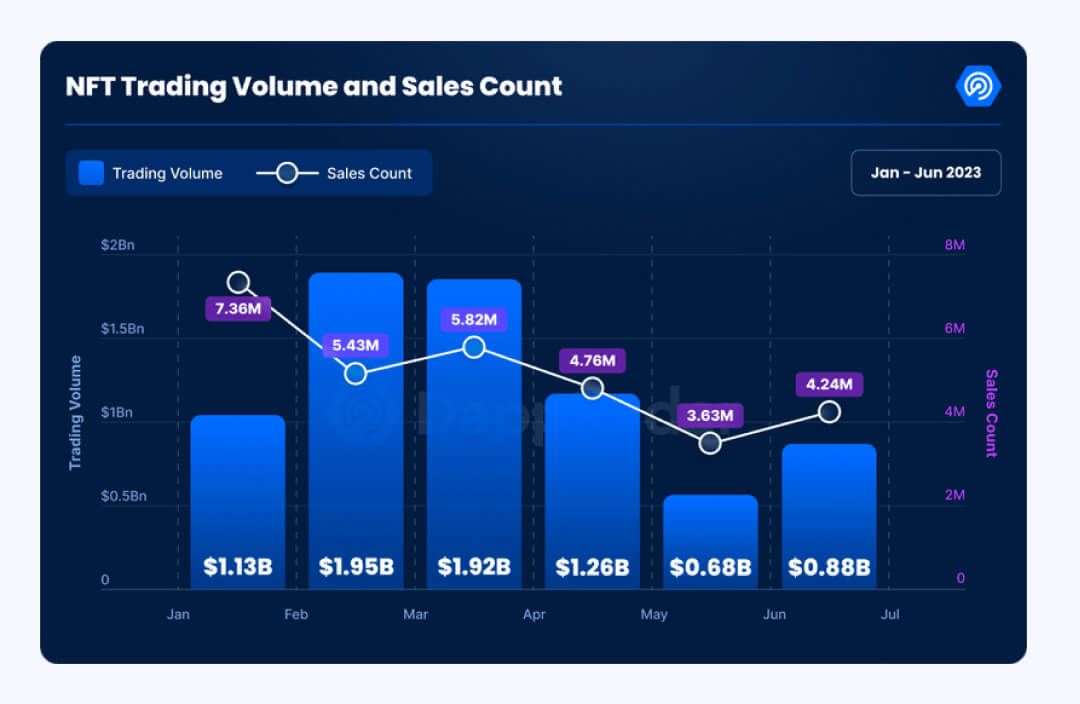Newsletter: The New Social Media Graph
This week we cover the launch of Threads by Meta <> Twitter, Thoughts on Social media landscape feat Dan Romero and Chris Carella, Onchain Hypercultures, the “potential” rise of CBDCs, June Industry report via Market Trends, mainstream news and Signal TL;DR.
By Forefront - Jul 10, 2023
Good morning and welcome to edition 148th of the FF Newsletter.
This week we cover the launch of Threads by Meta <> Twitter, Thoughts on Social media landscape feat Dan Romero and Chris Carella, Onchain Hypercultures, the “potential” rise of CBDCs, June Industry report via Market Trends, mainstream news and Signal TL;DR.
Let's get to it.
👋 Looking for a way to support Forefront? We’re opening up the FF Newsletter to sponsors interested in sharing their company, project, or community with +10,000 of web3’s most curious minds. If you are interested in becoming a sponsor, check out our Sponsorship Page or DM us on Twitter.
Week’s Highlight
In light of Twitter's rate-limiting fiasco and a plethora of other problems on the platform since Elon Musk took over, Meta pounced.
This week, Instagram (owned by Meta) launched its Twitter competitor: Threads. The app allowed for sign-in with your Instagram account, making it possible to import your entire Instagram social graph over to Threads. Among other features, Head of Instagram Adam Mosseri announced that the team would be building in support for ActivityPub. ActivityPub is a protocol that is used to post on decentralized networks like Mastodon, which would allow the platform to support interactions with other fediverse servers in the future.
At first glance, Threads might seem like yet another fad. Twitter has been something of a cockroach over the last 5 years, maintaining its influence and core user base despite many attempts to overtake the app. But to many folks, this is the first time Twitter has felt truly weak, and Mark Zuckerberg smelled the blood in the water.
Lots has happened as a result: Elon announced a lawsuit against Meta over Threads and called Zuck some choice words, celebrities are flocking to Threads but finding that the algorithm isn't quite what folks wanted, and much more. Meanwhile, with only 5 days since launched, Threads app has already surpassed 100 million users, reaching the milestone dramatically faster than even ChatGPT.
Crypto builders are using this as an opportunity to re-state the importance of web3 social. Protocols like Farcaster and Lens are continuing to grow in popularity. Onchain media is owning much of the conversation, as folks realize that even though Twitter isn't dead, their connection to their built audiences is throttled. And some folks are even wondering whether DAOs like Nouns are indicative of what "web3 social" might actually look like in the future.
Take Note. The social media landscape is rapidly shifting, and the speed of change will likely accelerate over the next year. Crypto has an important role to play in solving many of the problems that users face across these platforms, and it will be interesting to see how various protocols capitalize on blood in the water.
What's Poppin'
Spotlight Releases CAPSULE 004: Collective Creation
Capsule 004 on Spotlight is live, this time with a guest curator: Nick Hollins from UFO. Spotlight curates ideas and experiments worth collecting from across Ethereum. Nick's curation focused on experiments in collective creation, featuring folks from Water & Music, The Park, Refraction, Seed Club, and more. Spotlight also rolled out new features such as Curator Notes and an ERC1155 Library + support for Zora Network. If any of the ideas from Capsule 004 resonate with you, be sure to collect and support the creators!
Seedclub Announces SC06 Cohorts
Last week, Seed Club announced SC06, the genesis cohort of their Consumer Crypto Accelerator. The projects span across three key sectors: NFTs as platforms, onchain media is social media, and creator superpowers. Seed Club also announced Testflight Club, a new community for early adopters who want to help steward consumer crypto products towards mass adoption. All in all, this shift in focus toward "consumer crypto" is exactly the mindset we need to onboard the next hundred million people onchain. Good luck to the Seed Club team!
Prophet Motives & Knightwork States
In this Folklore commissioned essay, the author -- Wassim Z. Alsindi -- explores the intersection of technology, capital, and spirituality, questioning whether they form an unholy trinity. The essay delves into the emergence of new technology-mediated religious movements, such as transhumanism and cosmism, suggesting that they continue the trend of reifying spirituality through capital and technology. It examines the rise of network states, special economic zones, and charter cities facilitated by blockchain technology, drawing parallels to colonialism and neocolonial statecraft. The essay also explores the historical precedent of Crusader orders as network states and reflects on their parallels with present-day organizations and movements. Ultimately, it raises questions about the motivations and consequences of these phenomena in the contemporary world.
Onchain Hypercultures: Plausible Adoption Funnels for Global Integration
This essay explores the concept of on-chain hypercultures within the context of decentralized protocols. It introduces the idea of hyperstructures, hypercultures, and hypercommons as the three interconnected layers necessary for the manifestation of on-chain hypercultures. The essay suggests that the incentives for scaling and maintaining a culture can come from both capital-driven incentives and social-common incentives. It examines the distribution of incentives within each layer and proposes that better company models, creator economies, and a better planet can serve as adoption funnels for hyperstructures, hypercultures, and hypercommons, respectively. The essay acknowledges that further exploration and understanding are needed in this speculative area of thinking, but emphasizes the importance of adoption funnels that go beyond traditional cultural norms.
In this interview, Dan Romero (Farcaster co-founder) and Chris Carella & Osama Khan (Purple co-founders) discuss the challenges of the current social media landscape and the need for a new infrastructure. Dan highlights the logic of enclosure that keeps users and developers locked into existing platforms, making it difficult to create alternatives. Farcaster aims to create an ecosystem where users can own their data, and content and relationships can freely move between apps built on the protocol. He draws parallels to the evolution of internet protocols. Chris and Osama emphasize the importance of an open and composable social networking protocol and how Farcaster enables users to build on top of it. The interview also explores the role of Purple, an independent DAO proliferating the Farcaster protocol, in fostering a decentralized and credible ecosystem. The founders envision a future with numerous entities like Purple, promoting neutrality and decentralization.
The Rise of Web3 Social #1 - Mapping the Space
What is Web3 Social? How do Web3 social apps differ from Web2? Are the early promises of decentralization, ownership, and trustlessness on track, or are they faltering under the myriad trade-offs that come with building complex technology? What changes are in store for users, creators, and their communities? Friend-of-Forefront Louis explores these questions and more, mapping the "web3 social" ecosystem and examining the potential of these protocols and applications. This piece is the first in a series, so stay tuned for more.
The Potential "Rise" of CBDCs Vs U.S
The Bank for International Settlements suggests that there could be fifteen retail and nine wholesale CBDCs publicly circulating in 2030. More than nine out of ten central banks engage with other stakeholders when designing proof of concepts, pilots, or live CBDCs. Consumers seem to be ready for a CBDC.
Brazil's central bank is among more than a hundred experimenting with CBDCs. Others that matter for this discussion include the United Arab Emirates, Russia, Singapore and China, which is streets ahead in rolling out its electronic currency, the e-CNY. China, of course, has made no secret of its desire to reduce its dependency on dollars.
How should the U.S. respond?
Michael Casey writes for Coindesk that "I see this is an "if you can't fight them, join them" moment. There's no getting around Wall Street banks' gradual loss of intermediary status, which will mean Washington can no longer use those institutions as agents for surveilling the world's transactions. The U.S. should accept that reality and consider how to leverage the potentially fleeting advantage it still enjoys as the issuer of a currency desired the world over. It should lean into the "soft power" aspects of the dollar's dominance -- the open, rule-of-law values that underpin its value -- and give up on the "hard power" elements of gatekeeping and control."
Latest on Mainstream...
First, in response to Coinbase's filing stating that the SEC does not have sufficient jurisdiction to bring a lawsuit against it, the SEC claimed that Coinbase acknowledged the possibility that federal securities laws would apply to its listings years ago.
Next, Singapore is enforcing new crypto consumer protection measures as the city-state continues applying regulation to its burgeoning crypto industry. Chief among the new measures, the Monetary Authority of Singapore (MAS)---the country's chief financial regulator---will enforce a ban on lending and staking for retail customers (individual traders, as opposed to institutional clients), a measure which has been on the table since last October.
Finally, Dior has unveiled its B33 sneaker range that will launch later this week. Each physical sneaker includes an NFC chip tied to a NFT on the blockchain. However, the NFT will also unlock "dedicated services" although there's no commitment to providing rewards. Like several other brands, no mention is made of NFTs or crypto apart from a reference to the Ethereum blockchain in the product details.
Signal TL;DR
Evaluation of business models and strategic bets in Web3 Gaming
This piece by Derek Lau dives into the exciting world of Web3 games. It explores how blockchain technology and decentralized finance are revolutionizing game monetization. The article highlights the potential of in-game economies, play-to-earn mechanics, NFTs, and community engagement in shaping new and innovative business models for Web3 games. It's an insightful glimpse into the evolving landscape of game development and monetization in the Web3 era.
▹ Deep Dives - Network Effects in Web3 Games
▹ Opinion - On Blur
▹ Research - Adoption of CBDCs
▹ Interesting - Boot to Onchain
▹ Cool - Onchain Live Concert
▹ NFT - Zora x Opensea
▹ Watch - AIxCrypto
▹ Listen - Digiphysical Goods
▹ Techy - Ethereum's New Data Economy
▹ Tooling - Nouns Builder Updates
◎ Check out Signal for daily top web3 social headlines
Market Trends
DappRadar's June industry report is out with some interesting findings.
Despite regulatory uncertainty, the Dapp industry experienced a modest growth of 1.4% in June, averaging 1,994,805 daily unique active wallets (dUAW). Gaming continues to lead with a 36% activity share, closely followed by DeFi at 35%.
Additionally, Ethereum dominates 72% of NFT trading volume despite making up only 12% of sales, while Polygon stands out with 35% of NFT sales and 1.3 million traders.
In June, however, the NFT market exhibited signs of recovery with trading volumes reaching $888 million, yet not quite hitting the $1 billion milestone. NFT trading volume dropped 38% from Q1 to Q2. NFT sales also saw a 9.2% decrease. Bitcoin Ordinals registered $210.7 million in trading volume in the year's second quarter while the BAYC's price floor hit its lowest point in 20 months.
Finally, even though the industry recorded increased adoption of DeFi services, the total value locked (TVL) in these Web3 financial platforms faced a slight decrease of 1.86%, settling at $77.68 billion.

For the Culture

👋 Looking for a way to support Forefront? We’re opening up the FF Newsletter to sponsors interested in sharing their company, project, or community with +10,000 of web3’s most curious minds. If you are interested in becoming a sponsor, check out our Sponsorship Page or DM us on Twitter.
The information in this newsletter is not intended to constitute legal, financial or investment advice and should not be construed or relied upon as such. Any opinions reflected are the opinion of the author(s) of the newsletter only and not necessarily of Forefront. Please DYOR.
